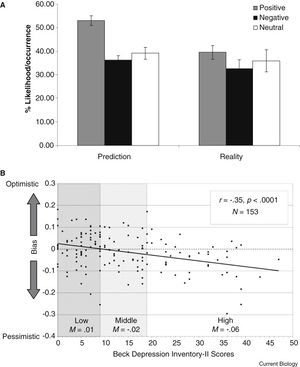Optimism bias: Difference between revisions
mNo edit summary |
mNo edit summary |
||
| Line 3: | Line 3: | ||
* People are excessively and unrealistically optimistic when judging their driving competency and accident risk.<ref>'''The optimism bias and traffic accident risk perception.''' Accident Analysis & Prevention. Volume 21, Issue 4, August 1989, Pages 333-340. David M.DeJoy. <nowiki>https://doi.org/10.1016/0001-4575(89)90024-9</nowiki>. Accessed on 22 August via <nowiki>https://www.sciencedirect.com/science/article/abs/pii/0001457589900249</nowiki>.</ref> | * People are excessively and unrealistically optimistic when judging their driving competency and accident risk.<ref>'''The optimism bias and traffic accident risk perception.''' Accident Analysis & Prevention. Volume 21, Issue 4, August 1989, Pages 333-340. David M.DeJoy. <nowiki>https://doi.org/10.1016/0001-4575(89)90024-9</nowiki>. Accessed on 22 August via <nowiki>https://www.sciencedirect.com/science/article/abs/pii/0001457589900249</nowiki>.</ref> | ||
* People tend to think hazardous events at work are less likely to happen to themselves compared to others doing the same job.<ref>'''It Won't Happen to Me''': An Investigation of Optimism Bias in Occupational Health and Safety. Carlo Caponecchia. First published: 23 March 2010. Accessed on 22 August 2022 via <nowiki>https://onlinelibrary.wiley.com/doi/abs/10.1111/j.1559-1816.2010.00589</nowiki>.</ref> | |||
* Students expect to receive higher starting salaries and more job offers than they end up getting. | * Students expect to receive higher starting salaries and more job offers than they end up getting. | ||
* People tend to underestimate how long a project will take to complete and how much it will cost. | * People tend to underestimate how long a project will take to complete and how much it will cost. | ||
Revision as of 06:24, 22 August 2022
Optimism bias is a cognitive bias that causes us to believe that they themselves are less likely to experience a negative event relative to others. Scientists has shown this as erroneous logic in multiple human studies revealing:
- People are excessively and unrealistically optimistic when judging their driving competency and accident risk.[1]
- People tend to think hazardous events at work are less likely to happen to themselves compared to others doing the same job.[2]
- Students expect to receive higher starting salaries and more job offers than they end up getting.
- People tend to underestimate how long a project will take to complete and how much it will cost.
- We expect greater pleasure from a vacation than we subsequently do.
- We anticipate encountering more positive events in an upcoming month (such as receiving a gift or enjoying a movie) than we end up experiencing (see Figure 1)[3].
Evidence, indicates that most people have ingrained optimism biases and that too much optimism is detrimental to mental health[3]. The evolutionary psychology reasoning as to why the bias exists is that early humans had to risk their lives every day. If they were acting on pure rationality our line would have starved to death.
Death is the ultimate risk for humans. However, we need to do it, however if we thought about it too much we would not do anything. This is why medicine is so expensive in US and has to be socially administered in the majority of civilised countries. The greatest product you can see someone is the fear of death. The optimism bias has to exists otherwise nothing would be done.
- ↑ The optimism bias and traffic accident risk perception. Accident Analysis & Prevention. Volume 21, Issue 4, August 1989, Pages 333-340. David M.DeJoy. https://doi.org/10.1016/0001-4575(89)90024-9. Accessed on 22 August via https://www.sciencedirect.com/science/article/abs/pii/0001457589900249.
- ↑ It Won't Happen to Me: An Investigation of Optimism Bias in Occupational Health and Safety. Carlo Caponecchia. First published: 23 March 2010. Accessed on 22 August 2022 via https://onlinelibrary.wiley.com/doi/abs/10.1111/j.1559-1816.2010.00589.
- ↑ Jump up to: 3.0 3.1 Hope, optimism and delusion. Psychiatr Bull (2014). Rebecca McGuire-Snieckus1 2014 Apr; 38(2): 49–51. doi: 10.1192/pb.bp.113.044438. Accessed on 22nd August 2022, via https://www.ncbi.nlm.nih.gov/pmc/articles/PMC4115405/
